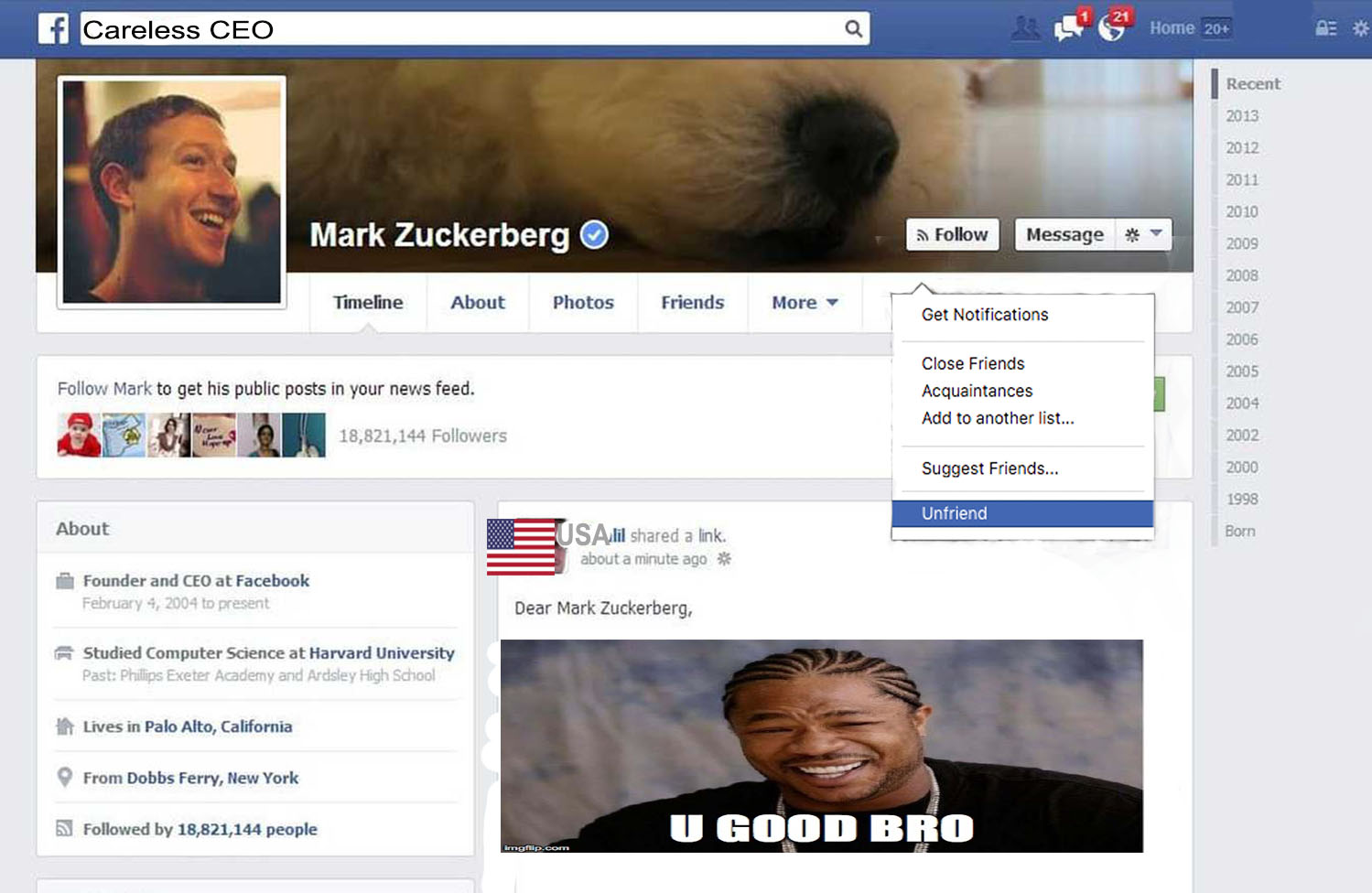As a fellow brother of the Alpha Epsilon Pi Fraternity, I feel a somewhat brotherly connection to Mark Zuckerberg, Founder, and CEO of Facebook (FB). Sure we never drank brews together or stayed up late in the Harvard University library working on term papers, but no one can say that we’re not brothers.
It is for this reason that I found myself upset that several state officials who manage public funds with holdings in Facebook (FB) are working on convincing the massive social network’s board to kick Zuckerberg out.
Early Wednesday morning, state treasurers from Rhode Island, Illinois, and Pennsylvania, as well as the New York City comptroller, signed a shareholder proposal asking Facebook’s board of directors to make the role of board chair an independent position. In frat bro terms, Zuck is no longer welcome at the house.
It is important to note that the proposal is like the adoption of a constellation or the enjoyment of kale salad; mostly symbolic. Any cinephile worth their weight in popcorn knows that in the movie, “The Social Network,” a film based on the founding of Facebook, Zuckerberg retains his majority shares of the company, despite diluting the shares of a very angry Eduardo Saverin.
Bravo, Andrew Garfield.
Zuckerberg holds absolute control of the board, with ownership of 28.2% of Facebook’s B shares. Sources suggest Zuck’s stake is worth just under $24 billion. In fact, his stock is worth nearly 10 times more voting power than a normal share, so proposals or not, Mark has final say.
Still, the move by government officials to ouster Zuckerberg represents a growing mistrust in the young chairman. In September, Facebook reveled that hackers breached the network’s security framework and millions of users had their information, including phone numbers, emails, and locations, compromised. According to Facebook, the cyber attackers stolen “access tokens” — digital keys that allow access to user accounts without a password. In addition to phone numbers and emails, the attackers gained access to user birthdates, hometowns, workplaces, as well as their most recent searches.
As questions surrounding corporate oversight emerge, Zuckerberg’s ability to lead comes into question.
“We need Facebook’s insular boardroom to make a serious commitment to addressing real risks — repetitional, regulatory, and the risk to our democracy — that impact the company, its shareholders, and ultimately the hard-earned pensions of thousands of New York City workers. ”
–Scott Stringer New York City Comptroller
Stringer continued to stress the essentiality of an independent board chair for Facebook, insisting that this is the only way to “reestablish trust with Americans and investors alike.”
Market analysts share in Stringer’s frustration and are instructing tech investors to avoid Facebook (FB) at all costs. Exponential ETFs chief executive Phil Bak told CNN Business’ weekly Markets Now live show that “investors aren’t getting their money’s worth.” On Wednesday, Bak said the company’s rush to repair its privacy and security debacles from the last few months comes “at the expense of growth.”
Investors are considering leaving the Facebook (FB) party early, given that the company’s stock opened at $150.13 on Thursday, down more than 30% from where it was in July. Facebook stock has been holding on for dear life following the events of the Cambridge Analytica data scandal. Despite Mark Zuckerberg’s testimony delivered in front of the U.S. Senate judiciary committee, as well as major adjustments to the platform’s privacy setting, Facebook has yet to calm the nerves of investors.
“For the first time, we’ve heard some grumblings from the advertiser community that the hot water that Facebook (FB) is in politically is creating some hesitation on budget allocations.”
–Ross Sandler, Analyst Barclays (from CNN)
With mistrust in the air, Facebook (FB) released Portal, a video phone that runs on Facebook (FB) Messenger, in hopes of reigniting the excitement surrounding the social network in the tech industry. Ironically enough, while Facebook initially claimed that no data would be collected through the new device, “even call log data or app usage data,” the company has since changed its answer.
The official statement from the company explains that Portal voice calling uses the same infrastructure as their Messenger application, so “when you make a video call on Portal, we collect the same types of information” collected on other Messenger-enabled devices. The company then admits that “other general usage data, such as aggregate usage of apps, etc., may also feed into the information that we use to serve ads.”
Yikes, Facebook…
As far as Zuckerberg’s career as chairman of Facebook, one can assume that his majority stake will keep him safe for the time being. My suggestion to you Mark, as my brother, is when your company is in hot water because of security breaches and data complications, don’t introduce a new piece of technology that may have the same issues you’re currently fighting off.
Just a suggestion, bro.





